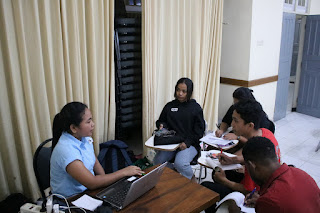Indonesia will welcome the democratic feast (General Election). At the same time, the young generations as part of Indonesia needs to prepare themselves to take part in the 2024 general election, especially the first-time voters. They need to enrich themselves with political literacy because general election involves many parties, including the organizers-KPU, contestants-legislative and presidential candidates, voters, pollsters, and the government.
The facts above encouraged Stube HEMAT Yogyakarta, as students and youth service accommodates its activists to be politically literate both nationally and globally by inviting them to take part in a seminar "Peaceful General Election 2024 in Diversity”. The event was organized by Communion of Churches in Indonesia in the Special Region of Yogyakarta (PGIW-DIY) at Mergangsan Javanese Christian Church, Yogyakarta (Friday, 18/11/2022). The student delegation consisted of three students from Lampung, three students from Yogyakarta, one student from Nias, two students from Sumba, and one student from Maluku. The seminar discussed General Elections from the perspective of Political Business, the General Election Commission (KPU), and church theology.
Prof. Dr. Nindyo Pramono, SH, MS., said that if the young generation does not understand the political map of Indonesian and stays apathetic to the political situation, 104 million youth votes will be seized by parties bringing the country to primordiality politics. It will be dangerous and lead to conflict, significantly in 2023 it is predicted to become a global financial recession that will affect the election in 2024. In such uncomfortable situation of Indonesia, the voters from the grassroots can be easily abused with a certain lure.
Regarding to the elections, the chairman of the General Election Commission (KPU) in Special Region of Yogyakarta, Hamdan Kurniawan, SIP., MA, revealed the laws and regulations as the guideline to realize peaceful election as a goal for conduciveness in a pluralistic society. The different political choices should not cause conflict in family, society, and church. Public spaces, both land and air must be clear from various disrespectful attitudes. Campaigns done by political parties and teams for presidential and vice presidential candidates must consider educational value, which in the real world everyone must respect each other, as well as in cyberspace. The campaigns should contain the value of political education for the community.
Meanwhile, the chairman of PGIW-DIY, Rev. Em. Bambang Sumbodo, S.Th, M.Min., emphasized that election participants should avoid black campaigns and not spread hoaxes. In line with Hamdan Kurniawan, Rev. Bambang also hoped that the church takes part in the democratic feast and maintain conduciveness in society. First, the church must not carry out black campaigns and primordialism politics. Then, the church must educate every team of election participants for an educational campaign. According to him, the long campaign period provides space for the general election participants to brainstorm ideas and disseminate the vision, mission, and program, in other words, all election participants must focus on disseminating positive content.
Peaceful elections are elections that are elegant and present no conflicts. So, how do young people behave to welcome the democratic feast? Our hope today is the 2024 election will run well and every campaign stage will run smoothly. So millennials must be careful to be aware of the current situation. Let us prepare ourselves by enriching literacy and education about the election, and involve ourselves responsibly so that we can be happy and have fun. The 2024 Election will be a humanist and democratic. ***





.jpg)

















.jpg)



.png)

.png)

.png)










.jpg)
.jpg)


.jpg)
.jpg)
.jpg)
